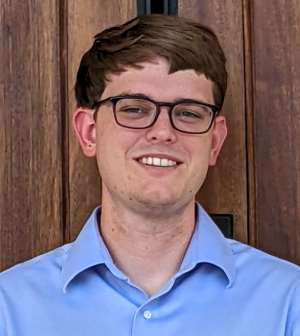Before Dr. Russ Hopper even applied to Mercer University’s School of Medicine, he knew he wanted to provide primary care to rural Georgians.
Growing up in the tiny town of Pitts, he saw firsthand the shortage of physicians in rural Georgia, and two experiences that exposed him to the clinical setting greatly influenced his decision to become a doctor.
As a high school student, he shadowed a primary care doctor in nearby Cordele. Then, as an undergraduate student at the University of Georgia, he participated in a program that allowed him to spend six weeks at primary care sites in Albany.

“That’s really what kind of solidified this for me because I just saw primary care was the coolest thing,” Dr. Hopper said. “You get to treat your neighbors and serve that important role in a community.”
His certainty led him to apply to Mercer’s Primary Care Accelerated Track (ACT) program. The special program allows students interested in practicing primary care to complete their coursework in an accelerated three-year program and graduate with less tuition debt.
Dr. Hopper earned his Doctor of Medicine from Mercer in 2019 and completed his residency at Piedmont Columbus Regional in 2022. He recently started work as a primary care physician at Atlas Internal Medicine in Cordele, practicing with the same doctor he shadowed as a high school student.
“The ACT program has been a big driver in my career path thus far because it helped me get into residency, and it provided a lot of financial assistance that basically makes it a lot more feasible to be out in the community being a rural doctor than it would have been if you came out with the extra loans and so forth,” Dr. Hopper said.
“But I also think that the education I got in the medical school adequately prepared me for residency, and I got to work with a lot of great folks at Mercer and enjoyed those years for sure.”
Primary care is the “most inclusive, equitable, cost-effective and efficient approach to enhance people’s physical and mental health, as well as social well-being,” according to the World Health Organization. These physicians serve as a patient’s entry point to the health care system and are responsible for helping patients manage their health.
The ACT program, which is offered on campuses in Macon, Savannah and Columbus, is one way the School of Medicine centers primary care in its mission to meet the health care needs of rural and medically underserved areas of Georgia. About a dozen schools in North America offer an accelerated track Doctor of Medicine program, but only one other school has a dedicated primary care track.
Mercer started its ACT program, which is funded by the state of Georgia, in 2012. It was designed to increase the number of primary care physicians in medically underserved rural Georgia counties, said Terri Walker, director of special programs at the School of Medicine.
The ACT program is parallel to the School of Medicine’s four-year Doctor of Medicine program. To be eligible for the ACT program, students must be enrolled in their first year of the four-year program, be in good academic standing, have strong ties to medically underserved rural Georgia and have a calling to practice primary care.
The program offers tracks in three primary care specialties — family medicine, general internal medicine and pediatrics. Only family medicine is offered in Columbus.
Students apply to the ACT program in January of their first year of medical school. If accepted, coursework starts to accelerate in June, just as students begin their second year of medical school. At this time, ACT scholars will begin a six-week family medicine, general internal medicine or pediatrics intersession at a partner hospital in Macon (Atrium Health Navicent The Medical Center), Savannah (Memorial Health University Medical Center) or Columbus (Piedmont Columbus Regional).
The ACT scholars return to campus in August and begin their second year of pre-clinical studies with their class. At the same time, they spend nine half days in a clinic from August to December creating a project with the clinic to address an issue in the community.
In their third and final year, the ACT scholars go through six- to eight-week clerkship rotations in family medicine, internal medicine, pediatrics, obstetrics and gynecology, surgery, psychiatry and emergency medicine. At the end of each rotation, students are tested on their understanding of each specialty.
“These are really motivated students that are very organized and committed to getting this done in an accelerated time,” Walker said.
State funding covers tuition for ACT scholars during their second and third years, allowing them to graduate with less debt. In addition, those who successfully complete the ACT program have a guaranteed residency at their ACT site.
Following their residency, graduates agree to serve for three years in a primary care setting in a medically undeserved rural Georgia county. The practice or hospital must accept Medicaid patients.
Since the ACT program’s inception, the School of Medicine has selected 72 scholars. Thirteen are currently in practice, and the others are either completing their residency or medical school, Walker said.
Dr. Hopper began working at Atlas Internal Medicine on Aug. 1. He’s started meeting new patients and is eager to develop relationships with them.
“I like the ability to be able to form a long-term relationship with a patient,” he said. “In most other aspects of medicine, you have a problem, and you’re addressing that problem, and when the problem’s addressed, that’s it.
“But primary care as designed should be a long-term relationship where in the good times and in the times where the patient’s health is in a worse place, that relationship continues and you’re still there and are able to help guide them on their health journey.”









